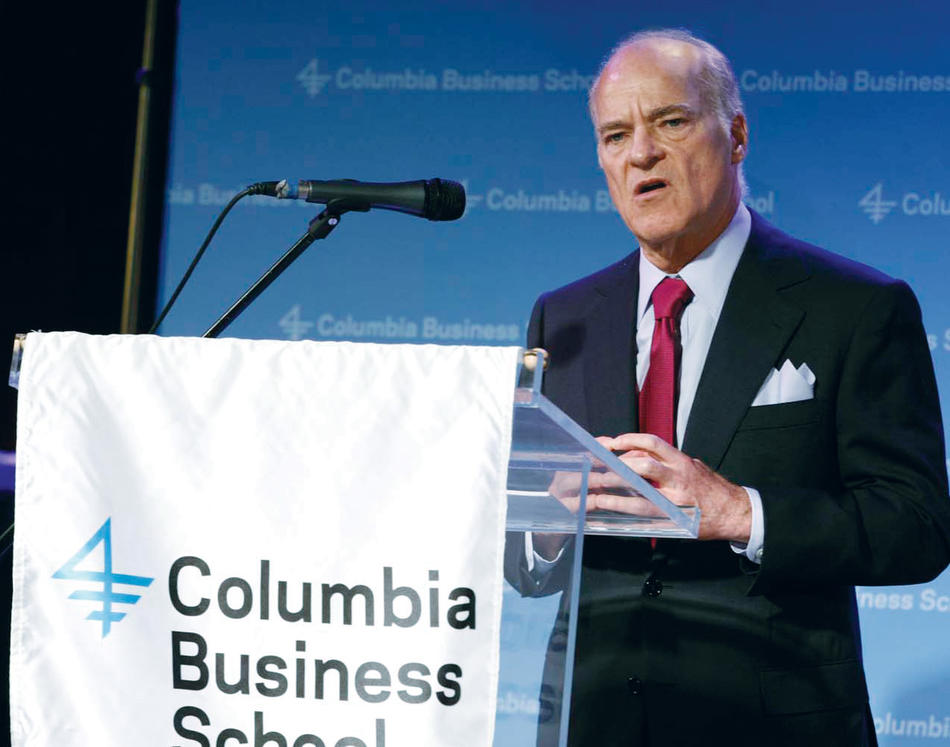Columbia has received the largest gift ever for its business school: a $100 million pledge from Henry R. Kravis ’69BUS for two new buildings in the Manhattanville section of West Harlem, just north of the University’s Morningside Campus.
Columbia Business School will eventually make its home between 130th and 131st Street, west of Broadway. The move is years away and additional money must be raised to develop the site: Kravis’s $100 million gift represents roughly one-quarter of the total funds that the business school aims to raise for the two buildings. One of the buildings will be named for Kravis, a pioneer in the private equity industry who has served on the school’s Board of Overseers for 20 years. The search for an architect is under way.
“Henry Kravis clearly understands that Columbia’s long-term vitality depends fundamentally on both the financial resources and the physical space needed to support talented students and faculty,” says President Lee C. Bollinger.
The business school, in making the move, will nearly double its physical space to 450,000 square feet. The school will also bring together its faculty, staff, and students for the first time in decades. Currently, its facilities are spread across five locations — Uris Hall, Warren Hall, and Armstrong Hall on the Morningside Campus and two office spaces in Midtown. According to business dean Glenn Hubbard, this hardly befits a school that is consistently ranked in the top 10 graduate business schools in the world: “We have the people and programs of a first-rate institution, yet facilities that are second-rate,” he says. “The disparity between the two has never been greater.”
The two new buildings, to be separated by a lawn and a plaza, will have spacious interiors to promote interaction among faculty and students. “The design of these new facilities will reflect the fast-paced, high-tech, and highly social character of business practice in the 21st century,” Hubbard says. “Business culture has been evolving away from the hierarchies that dominated organizations in the past. Instead, organizations are moving toward more horizontal, collaborative models, which underscores the importance of such social intelligence-based skills as leadership, management, teamwork, and negotiation.”
The school’s presence in Manhattanville will also benefit the local business community, according to Hubbard. He says the school will expand its numerous service programs, which provide guidance and support to entrepreneurs in Upper Manhattan. “These new facilities will enable us to deepen the two-way ties between the school’s intellectual capital and business practitioners,” he says. “We will be able to connect local entrepreneurs with cutting-edge knowledge and skills, and, in turn, deepen our students’ ability to apply what they are learning in the classroom to the real world.”
Kravis, a native of Tulsa, Oklahoma, attended Columbia Business School in the late 1960s. He says the experience “opened a new world” to him. He landed a job on Wall Street while studying at Columbia and subsequently cofounded Kohlberg Kravis Roberts & Co. (KKR), a leading investment firm where today he’s co-CEO and cochairman.
Previously, Kravis donated more than $24 million to the business school for such initiatives as Columbia CaseWorks, an effort to collect case studies of real-world business challenges that are based on Columbia research and that B-school students can analyze; the Meyer Feldberg Distinguished Fellowship Program; and several endowed professorships.
Regarding his $100 million pledge, Kravis says: “We’re not just constructing a building — we’re creating a community of entrepreneurs. What matters to me is what happens in and around that building and the impact it has on our students, this community, our nation, and the world.”



